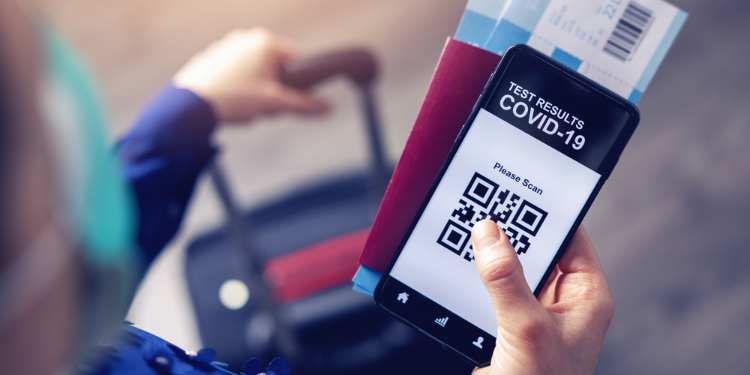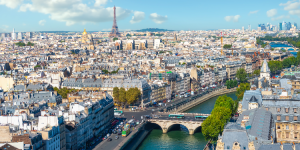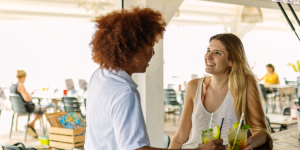
By late 2022, most countries have already eased all Covid-related travel restrictions. However, a few countries, for instance, the US, the UAE and Indonesia, still require vaccination. Japan even requires a booster shot to consider a foreign national fully vaccinated. Some countries also accept a negative PCR test or a quarantine period as an equivalent to vaccination.
Non-citizens flying into the US need to be fully vaccinated
Since November 2021, the United States has been allowing all fully vaccinated travelers to fly into the country. In January 2022, the vaccination requirement was extended to travelers entering through land routes or by sea. A negative PCR test cannot be substituted for proof of vaccination. Those who are Covid-negative but haven't been vaccinated, or those who have only been partially vaccinated, will still not be allowed to enter. There are only a few people who can replace this with a PCR test and quarantine.
Full vaccination is defined as two doses of a recognized vaccine. A third (booster) dose isn't required. The US accepts all vaccines recognized by the Food and Drug Administration (FDA) and World Health Organization (WHO). For instance, even if the Chinese vaccine Sinovac isn't approved by the FDA, it was granted emergency approval by the WHO. Thus, a traveler who's received two jabs of Sinovac can travel to the US. In October 2021, US health authorities also clarified that they would accept travelers who've received mixed vaccine doses. Many Canadian travelers, notably, have received mixed doses of Covishield and another vaccine (e.g., Pfizer).
Only a few travelers who are not US citizens can be exempted from the vaccination requirement. They are children, diplomats and government representatives, US Army personnel (of any nationality), sea crew members, refugees, people from countries with limited vaccine availability, and travelers with documented medical issues that prevent them from getting vaccinated. The CDC has a list of countries with limited vaccine availability: Yemen, Syria, Papua New Guinea, Haiti and 15 African countries (including Nigeria, Tanzania, Senegal and Madagascar). These travelers need to take a PCR test and self-quarantine for 5 days as an alternative.
Once in the country, very few places will require proof of vaccination. One exception is universities. Many American universities, including prestigious ones like Harvard and the University of Chicago, still require proof of vaccination from staff members and students. Some exemptions can be made on medical or religious grounds.
PCR test required in China, vaccination required in Hong Kong
China is one of the few remaining countries to still have most of the border restrictions it had at the start of the pandemic. Only a few foreigners are allowed to enter China: those with a valid residence or work permit and international students from certain countries. While Chinese nationals can travel abroad as tourists, inbound tourism to China is still suspended.
Travelers to Mainland China need to have two (not one) negative PCR tests 48 hours prior to boarding their flight. This is required even if they are fully vaccinated. Before flying, they also need to contact the Chinese embassy/consulate in their home country to apply for a Health QR Code, called an HDC mark for foreigners.
When they land in China, they are screened again and are subject to a mandatory quarantine of 10 days. 7 out of these 10 days are in a government-mandated facility, usually a hotel. The traveler bears the expenses, which can be around 2000 yuans (about 300 US dollars) for the entire stay. It is then followed by 3 days of self-quarantine at home. Reuters reported in early November that this quarantine might soon be shortened (not eliminated) by the Chinese authorities.
How about Hong Kong? As a special administrative region of China, Hong Kong has its own rules. Unlike Mainland China, it requires both proof of vaccination and a Rapid Antigen Test before the flight. Upon landing in Hong Kong, travelers then need to do a PCR test at the airport itself. They can leave the airport and go to their hotel/house after this test, but they will be placed under 3 days of medical surveillance.
During these 3 days of surveillance, they may not go to high-risk venues like restaurants, museums and hair salons. They also need to self-monitor by taking daily rapid antigen tests and temperature measurements (twice daily) for 7 days. They have to put this information up on the government's “StayHomeSafe” app.
As for the proof of vaccination, it must show that two doses of the following vaccines were administered: AstraZeneca, Anhui Zhifei Longcom, Covaxin, Pfizer, CanSinoBIO, Sputnik V, Vero Cell, Janssen, Moderna, Nuvoxavid, Covishield, Covovax, Sinopharm, and Sinovac. Exemptions are made for travelers with a medical certificate, children under 12, and travelers from Mainland China, Macao, or Taiwan.
Travellers to Japan need three vaccine doses or a negative PCR test
Japan only very recently fully reopened its borders to tourists. Since October 11, 2022, tourists are once again allowed to enter Japan without a visa, provided, of course, that their country previously had a visa agreement with Japan. Those who weren't eligible for visa-free travel before the pandemic will require a visa. The borders were also fully opened for international students for Fall 2022 after smaller batches of students were allowed in earlier this year.
Despite this, vaccination requirements to enter Japan remain strict. Two jabs aren't considered enough for a fully-vaccinated status in the country: a (third) booster dose is obligatory. They can be mixed doses of any vaccines accepted by the WHO, including those accepted for emergency use.
Thankfully, unlike the US, Japan is willing to accept a negative PCR test in case a traveler is not fully vaccinated. It must be performed 72 hours prior to flying. People who received only two jabs will be required to take the PCR test.
It's also strongly recommended to anyone to download the MySOS app prior to traveling. Travelers can upload their vaccine certificate or negative PCR test on this app. The app will verify the documents' authenticity within a few hours, and this will speed up the traveler's immigration procedures at the airport in Japan.
The UAE requires vaccination, a PCR test, or a recovery certificate
The United Arab Emirates, one of the busiest transit hubs for international flights and an expat hotspot, offers three possibilities to travelers. They must either be vaccinated, or must have done a PCR test 48 hours before arrival, or must have a certificate that proves that they had recovered from Covid within 30 days of their trip. Recent infection and recovery provide the traveler with temporary natural immunity.
The vaccine or recovery certificate must have a QR code that can be scanned by Emirati authorities. The vaccine can be any vaccine approved by the WHO and UAE. Only one dose, or partial vaccination, is required if this dose was administered within 1 month of the travel date. Two doses (i.e., full vaccination) are required if the first dose was done over 1 month ago.
A few people can be exempted from either a vaccination/recovery certificate or a PCR test. Exempted non-UAE nationals are children under 12, people with documented disabilities or medical conditions that prevent vaccination, domestic workers accompanying a sponsor (who must be a UAE citizen), and first-degree relatives of UAE nationals.
Indonesia requires full vaccination, recent recovery from Covid, or quarantine
All travelers over the age of 18 must be fully vaccinated to enter Indonesia, including the tourist hotspot Bali. All minors, regardless of whether they are teenagers or under 12, benefit from an exemption. Others who are exempted are diplomatic personnel, government representatives, and people with documented medical conditions that make vaccination dangerous.
Fully vaccinated status translates to one dose of the Johnson & Johnson vaccine or two doses of other vaccines accepted by the WHO. Like in Dubai, travelers can alternatively present a recent quarantine certificate or Covid recovery certificate in lieu of a vaccination pass. Thankfully, Indonesia does provide another entry route for the unvaccinated and partially vaccinated: they need to quarantine for 5 days.
Once travelers have landed at an Indonesian airport, they are screened again, regardless of their vaccination status. If they are found to have a temperature above 99.5°F (37.5°C), they are subjected to a PCR test at the airport itself. If the test turns out to be positive, they are isolated in their house/hotel or a facility, again, regardless of vaccination status. The travelers will need to bear all associated costs – PCR test, extra days at the hotel, etc.
The Philippines requires full vaccination or a negative PCR test
In November, the Philippines eased its sanitary restrictions for inbound travelers. Previously, all unvaccinated or partially vaccinated travelers had been required to quarantine for 5 days at a government facility at their own expense. From now on, however, they only need a negative PCR test taken 24 hours prior to flying.
Fully vaccinated travelers only have to go through airport screenings. They must have received two doses of a vaccine approved by the Philippine Food and Drug Administration or WHO. Children under the age of 15 are exempted from proof of vaccination and a negative PCR test result.
Fiji requires full vaccination for travelers over 16
This tropical archipelago of Oceania requires two doses of an approved vaccine from both adults and older teenagers aged 16-17.
Teenagers, however, can be exempted from the requirement if they are from a country where vaccination hasn't been extended to minors. Their parents need to contact Fiji's Border Health Protection Unit by email to request an exemption. Of course, travelers with documented medical conditions can also apply for the same exemption.
The vaccines recognized by Fiji are AstraZeneca, Pfizer, Moderna, Johnson and Johnson, Nuvaxovid (Novavax), Coronavac (Sinovac), Covishield, BBIBP-CorV (Sinopharm), Covaxin and Sputnik V. What if the vaccine you did is not in this list? If at least the second of your two doses is of a recognized vaccine, you can request an exemption. If you received three instead of two shots of an unrecognized vaccine, your case will also be assessed for exemption. However, if you received only two doses of it, unfortunately, you will not be allowed in.
Fiji is very strict when it comes to vaccination for inbound travelers. Unlike some other countries with restrictions, in Fiji, a traveler cannot use a negative PCR test or quarantine period as an alternative to a fully vaccinated status. In addition, buying travel health insurance is mandatory when visiting the country, even on short tourist stays. Travelers may also be subject to second screenings and Rapid Antigen Tests at the airport based on their travel history.



















